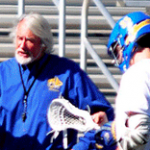Home / Articles-Drills /Featured-Bottom / Article: 2 Sides to Every Coaching Coin, Mars Hill
 Following my recent podcast with Coach Dave Klarmann from Mars Hill I simply can’t get his philosophical approach to coaching his team out of my head… and I wonder. He has been an outstanding coach for 25 years or more, and his philosophies remain straightforward and basic.
Following my recent podcast with Coach Dave Klarmann from Mars Hill I simply can’t get his philosophical approach to coaching his team out of my head… and I wonder. He has been an outstanding coach for 25 years or more, and his philosophies remain straightforward and basic.
I have been on a mission over the last six or seven years to find more drills, faster practices, more game emulating ‘snapshots’ to frame drills, tracking touches (300 per practice or more,) jamming 12 drills into every practice, changing drills and sequence every day… well if you follow our site you understand.
Coach Klarmann follows a more basic philosophy regarding practices and practice planning. [private] First, do not go into the season with preconceived notions about players (starters and positions.) Second, let them play, watch, teach and evaluate. I might also suggest a deep dose of some of his other philosophies, emphasizing to his players to get better, and the fact that ground ball attainment is perhaps more about courage than it is about a ton of ground ball drills.
His practice plan remains consistent and basic. Keep in mind, they run four different offenses, have had a .400 plus conversion rate on Man Up opportunities, and last year won their conference tournament all with a roster of under 30 players last year. So this is not a simple coaching philosophy, just a more basic approach to practice. And it kind of makes you think, or at least it did for me.
The practices begin with stickwork; a traditional approach to transition drills, often in progression. But for the next 70-90 minutes they are in half field then full field scrimmages without some of my favorite twists (double the first pass, ground ball, pass, pass to begin, etc.) To be fair, Coach was to quick to repeatedly mention, “Use what you have…” and with the smaller roster last year necessitated more half field.
Middies often play in 10-minute segments on the half field, both offense and defense at different ends, mixing older and younger players for weeks into the fall and in the spring. Then a hefty does of full field where they work on Rides and Clears, Face Offs, just sprinkled throughout the full field action. And so on…
It was a fascinating interview from this well recognized coach who also has a National Championship on his resume while at North Carolina.
So what did I learn? I still steadfastly believe in the progressive practice plans, variations, a ton of transition and my the other elements I hold so near and dear to my heart but perhaps I could do more on just letting them play, even if it is in the half field. And I could certainly learn from his premise of not pre-determining who my first and second midfields will be without a week or two of practice where everybody plays with everybody regardless… We all like to think we give every player every opportunity to earn more playing time, but in this interview I learned I can do better.
In the spirit of coaching rationalization, I will still maintain the best coaches are always willing to consider change as we have heard in 120 hours of podcasts at the time of this article… And perhaps the change lesson here is more is not always better. Thus I plan on adding a day a week where we go a little more traditional and “let ‘em play!”
To listen to Coach Klarmann address some of these philosophies check out the ‘Preview’ of the full podcast in his own words, just click here
Love to get your thoughts below, mike@laxcoachmike.com
[/private]